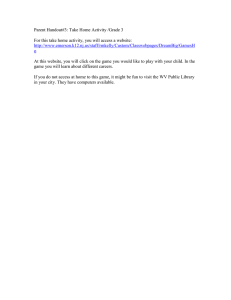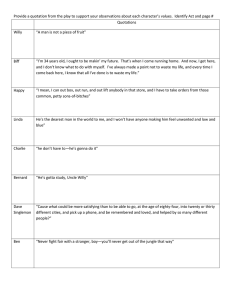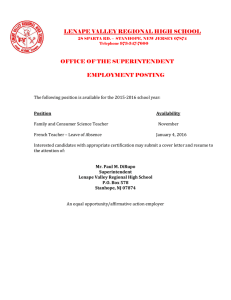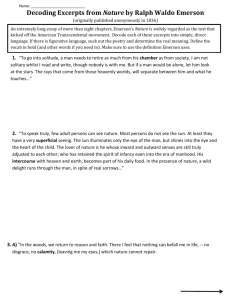Lit Drama Paper Jan 08
advertisement
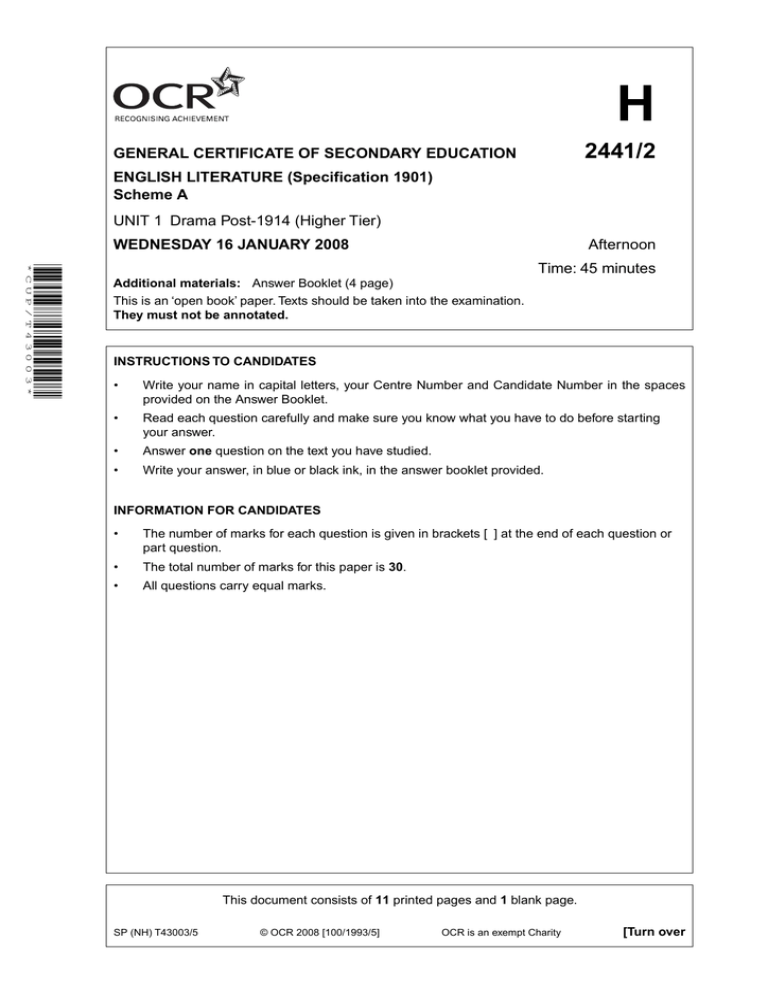
H 2441/2 GENERAL CERTIFICATE OF SECONDARY EDUCATION ENGLISH LITERATURE (Specification 1901) Scheme A UNIT 1 Drama Post-1914 (Higher Tier) WEDNESDAY 16 JANUARY 2008 Afternoon *CUP/T43003* Time: 45 minutes Additional materials: Answer Booklet (4 page) This is an ‘open book’ paper. Texts should be taken into the examination. They must not be annotated. INSTRUCTIONS TO CANDIDATES • Write your name in capital letters, your Centre Number and Candidate Number in the spaces provided on the Answer Booklet. • Read each question carefully and make sure you know what you have to do before starting your answer. • Answer one question on the text you have studied. • Write your answer, in blue or black ink, in the answer booklet provided. INFORMATION FOR CANDIDATES • The number of marks for each question is given in brackets [ ] at the end of each question or part question. • The total number of marks for this paper is 30. • All questions carry equal marks. This document consists of 11 printed pages and 1 blank page. SP (NH) T43003/5 © OCR 2008 [100/1993/5] OCR is an exempt Charity [Turn over 2 BLANK PAGE © OCR 2008 2441/2 Jan08 3 You must answer one question from this Paper. Pages Questions ARTHUR MILLER: Death of a Salesman 4–5 1–3 HAROLD PINTER: The Caretaker 6–7 4–6 BRIAN CLARK: Whose Life Is It Anyway? 8–9 7–9 10–11 10–12 Drama post-1914 R. C. SHERRIFF: Journey’s End © OCR 2008 2441/2 Jan08 [Turn over 4 ARTHUR MILLER: Death of a Salesman 1 WILLY: LINDA: WILLY: LINDA: WILLY: LINDA: WILLY: LINDA: WILLY: LINDA: WILLY: LINDA: WILLY: LINDA: WILLY: LINDA: WILLY: LINDA: WILLY: LINDA: WILLY: LINDA: WILLY: LINDA: WILLY: LINDA: WILLY: LINDA: WILLY: LINDA: WILLY: LINDA: © OCR 2008 Music is heard, gay and bright. The curtain rises as the music fades away. WILLY, in shirt sleeves, is sitting at the kitchen table, sipping coffee, his hat on his lap. LINDA is filling his cup when she can. Wonderful coffee. Meal in itself. Can I make you some eggs? No. Take a breath. You look so rested, dear. I slept like a dead one. First time in months. Imagine, sleeping till ten on a Tuesday morning. Boys left nice and early, heh? They were out of here by eight o’clock. Good work! It was so thrilling to see them leaving together. I can’t get over the shaving lotion in this house! (smiling) Mmm – Biff was very changed this morning. His whole attitude seemed to be hopeful. He couldn’t wait to get downtown to see Oliver. He’s heading for a change. There’s no question, there simply are certain men that take longer to get – solidified. How did he dress? His blue suit. He’s so handsome in that suit. He could be a – anything in that suit! WILLY gets up from the table. LINDA holds the jacket for him. There’s no question, no question at all. Gee, on the way home tonight I’d like to buy some seeds. (laughing) That’d be wonderful. But not enough sun gets back there. Nothing’ll grow any more. You wait, kid, before it’s all over we’re gonna get a little place out in the country, and I’ll raise some vegetables, a couple of chickens … You’ll do it yet, dear. WILLY walks out of his jacket. LINDA follows him. And they’ll get married, and come for a weekend. I’d build a little guest house, ’cause I got so many fine tools, all I’d need would be a little lumber and some peace of mind. (joyfully) I sewed the lining … I could build two guest houses, so they’d both come. Did he decide how much he’s going to ask Oliver for? (getting him into the jacket ) He didn’t mention it, but I imagine ten or fifteen thousand. You going to talk to Howard today? Yeah. I’ll put it to him straight and simple. He’ll just have to take me off the road. And Willy, don’t forget to ask for a little advance, because we’ve got the insurance premium. It’s the grace period now. That’s a hundred …? A hundred and eight, sixty-eight. Because we’re a little short again. Why are we short? Well, you had the motor job on the car … That goddam Studebaker! And you got one more payment on the refrigerator … But it just broke again! Well, it’s old, dear. I told you we should’ve bought a well-advertised machine. Charley bought a General Electric and it’s twenty years old and it’s still good, that son-ofa-bitch. But, Willy – 2441/2 Jan08 5 10 15 20 25 30 35 40 45 50 5 ARTHUR MILLER: Death of a Salesman (Cont.) WILLY: LINDA: Whoever heard of a Hastings refrigerator? Once in my life I would like to own something outright before it’s broken! I’m always in a race with the junkyard! I just finished paying for the car and it’s on its last legs. The refrigerator consumes belts like a goddam maniac. They time those things. They time them so when you finally paid for them, they’re used up. (buttoning up his jacket as he unbuttons it ) All told, about two hundred dollars would carry us, dear. But that includes the last payment on the mortgage. After this payment, Willy, the house belongs to us. 55 60 Either 1 Explore the ways in which Miller creates such a fascinating opening to Act Two here. [30] Or 2 How does Miller’s portrayal of Bernard contribute to the dramatic impact of the play? Remember to support your ideas with details from the play. Or 3 You are the young Biff. You have just left your father’s hotel room in Boston. Write your thoughts. © OCR 2008 [30] [30] 2441/2 Jan08 [Turn over 6 HAROLD PINTER: The Caretaker 4 MICK: Well, what it is, you see, I’m … I’m a bit worried about my brother. An extract of text has been removed due to copyright restrictions. © OCR 2008 2441/2 Jan08 7 HAROLD PINTER: The Caretaker (Cont.) An extract of text has been removed due to copyright restrictions. How would you like to stay on here, as caretaker? Either 4 Explore the ways in which Pinter makes this such a dramatic moment in the play. [30] Or 5 How does Pinter’s portrayal of the relationship between the brothers, Aston and Mick, contribute to the dramatic impact of the play? Remember to support your ideas with details from the play. Or 6 [30] You are Aston, just after you have asked Davies if he would like to stay (in the middle of Act One). Write your thoughts. [30] 65 © OCR 2008 2441/2 Jan08 [Turn over 8 BRIAN CLARK: Whose Life Is It Anyway? 7 DR EMERSON: HILL: DR EMERSON: HILL: DR EMERSON: HILL: DR EMERSON: HILL: DR EMERSON: HILL: DR EMERSON: HILL: DR EMERSON: HILL: DR EMERSON: HILL: DR EMERSON: HILL: DR EMERSON: HILL: DR EMERSON: HILL: DR EMERSON: HILL: DR EMERSON: HILL: DR EMERSON: HILL: DR EMERSON: HILL: DR EMERSON: HILL: DR EMERSON: HILL: © OCR 2008 Cross fade on Dr EMERSON’S rooms. Mr Hill? Sister just rang through. Dr Emerson? They shake hands. You’ve been seeing Mr Harrison? Yes. Tragic case … I hope you’ll be able to get enough money for him to ease his mind. Dr Emerson. It’s not about that I wanted to see you. I thought I was coming about that, but Mr Harrison wishes to retain me to represent him on quite another matter. Oh? Yes, he wants to be discharged. That’s impossible. Why? To put it bluntly, he would die if we did that. He knows that. It’s what he wants. And you are asking me to kill my patient? I am representing Mr Harrison’s wishes to you and asking for your reaction. Well, you’ve had it. It’s impossible. Now if that’s really all you came about … Dr Emerson, you can, of course, dismiss me like that if you choose to, but I would hardly think it serves anyone’s interests, least of all Mr Harrison’s. I am trying to save Mr Harrison’s life. There is no need to remind me of my duty to my patient, Mr Hill. Or mine to my client, Dr Emerson. … Are you telling me that you have accepted the job of coming to me to urge a course of action that will lose your client his life? I hadn’t accepted it … no … I told Mr Harrison I would talk to you first. Now I have and I begin to see why he thought it necessary to be represented. Alright … Let’s start again. Now tell me what you want to know. Mr Harrison wishes to be discharged from hospital. Will you please make the necessary arrangements? No. May I ask why? Because Mr Harrison is incapable of living outside the hospital and it is my duty as a doctor to preserve life. I take it that Mr Harrison is a voluntary patient here. Of course. Then I fail to see the legal basis for your refusal. Can’t you understand that Mr Harrison is suffering from depression? He is incapable of making a rational decision about his life and death. Are you maintaining that Mr Harrison is mentally unbalanced? Yes. Would you have any objection to my bringing in a psychiatrist for a second opinion? Of course not, but why not ask the consultant psychiatrist here? I’m sure he will be able to convince you. Has he examined Mr Harrison? 2441/2 Jan08 5 10 15 20 25 30 35 40 45 50 9 BRIAN CLARK: Whose Life Is It Anyway? (Cont.) DR EMERSON: HILL: DR EMERSON: HILL: DR EMERSON: No, but that can be quickly arranged. That’s very kind of you, Dr Emerson, but I’m sure you’ll understand if I ask for my own – whose opinion you are not sure of before he examines the patient. Good afternoon, Mr Hill. Good afternoon. MR HILL takes up his briefcase and leaves. (picks up the ’phone) Could you find out where Dr Travers is please? I want to see him urgently, and put me through to the hospital secretary please. Well put me through when he’s free. 55 60 Either 7 Explore the ways in which Clark makes this such a dramatic and significant moment in the play. [30] Or 8 How does Clark make the relationship between Ken Harrison and Dr Clare Scott such a memorable part of the play? Remember to support your ideas with details from the play. Or 9 You are Nurse Kay Sadler just after you and John have set up Mr Harrison’s room for the hearing. Mr Harrison has told you that he thinks John is ‘a tonic’ (in Act Two). Write your thoughts. © OCR 2008 [30] [30] 2441/2 Jan08 [Turn over 10 R. C. SHERRIFF: Journey’s End 10 TROTTER: STANHOPE: TROTTER: HIBBERT: STANHOPE: HIBBERT: TROTTER: HIBBERT: TROTTER: STANHOPE: HIBBERT: TROTTER: STANHOPE: TROTTER: STANHOPE: TROTTER: STANHOPE: TROTTER: STANHOPE: TROTTER: STANHOPE: TROTTER: HIBBERT: STANHOPE: HIBBERT: STANHOPE: HIBBERT: STANHOPE: HIBBERT: STANHOPE: HIBBERT: STANHOPE: HIBBERT: STANHOPE: HIBBERT: STANHOPE: HIBBERT: © OCR 2008 (stifling a hiccup) Just a cup o’ tea – then I’ll go and relieve young Raleigh. Pity ’e didn’t come down to supper. I told him to. I told him to come down for an hour and let the sergeant-major take over. I wonder why ’e didn’t come. That lad’s too keen on his ‘duty’. He told me he liked being up there with the men better than down here with us. (quietly) He said that? Yes. I told him about the chicken and champagne and cigars – and he stared at me and said, ‘You’re not having that, are you?’ – just as if he thought we were going to chuck it away! I reckon that raid shook ’im up more’n we thought. I like that youngster. ’E’s got pluck. Strong lad, too – the way he came back through the smoke after that raid, carrying that Boche under ’is arm like a baby. Did you see him afterwards, though? He came into that dug-out and never said a word – didn’t seem to know where he was. Well, ’e’s only a lad. (to HIBBERT) He actually told you he preferred being up with the men better than down here? That’s what he said. Well, I ’ope ’e gets the M.C., that’s all; ’e’s just the kid I’d like if ever I ’ave a kid – strong and plucky. Oh, for God’s sake forget that bloody raid! Think I want to talk about it? (surprised ) No – but, after all – Well – shut up! (uneasily) All right – all right. We were having a jolly decent evening till you started blabbing about the war. I didn’t start it. You did. You began it about – Well, for God’s sake stop it, then! All right – all right. Did I ever tell you the story about the girl I met in Soho? I don’t know – I expect you did. (undismayed ) It’ll amuse you. I’d been to a dance, and I was coming home quite late – Yes, and it’s late now. You go on duty at eleven. You better go and get some sleep. It’s all right. I’m as fresh as a daisy. You may be. But go to bed. What? (louder) I said, ‘Go to bed!’ I say, that’s a nice end to a jolly evening! I’m sorry. I’m tired. (perkily) Well, you better go to bed! There is silence. STANHOPE looks at HIBBERT, who sniggers. What was that you said? I was only joking. I asked you what you said. I said, ‘You better go to bed.’ 2441/2 Jan08 5 10 15 20 25 30 35 40 45 50 11 R. C. SHERRIFF: Journey’s End (Cont.) STANHOPE: HIBBERT: STANHOPE: HIBBERT: STANHOPE: STANHOPE’S flushed face is looking full into HIBBERT’S. HIBBERT gives the ghost of a snigger. Clear out of here! (rising unsteadily) What – what d’you mean. Get out of here, for God’s sake! (blustering) I say – look here – Get out of my sight! With a frightened glance at STANHOPE, HIBBERT sneaks quietly away into his dug-out. There is silence, and the guns can be heard – deep and ominous. Little worm gets on my nerves. 55 60 Either 10 How does Sherriff make this such a dramatic and revealing moment in the play? Or 11 How does Sherriff make the relationship between Stanhope and Raleigh such a dramatic and important part of the play? Remember to support your ideas with details from the play. Or [30] 12 You are Stanhope, just after the Colonel has suggested Osborne and Raleigh for the surprise daylight raid (in Act Two, Scene Two). Write your thoughts. © OCR 2008 [30] [30] 2441/2 Jan08 12 Copyright Acknowledgements: Q.1 Q.4 Q.7 Q.10 Arthur Miller, Death of a Salesman. Copyright © 2000 by Arthur Miller, reprinted with permission of The Wylie Agency. © Harold Pinter, The Caretaker, Faber and Faber, 1960. Reprinted by permission of Faber and Faber Ltd. © Brian Clark, 1978, Whose Life Is It Anyway. Reproduced by kind permission of Amber Lane Press. © R. C. Sherriff, Journey’s End. Reproduced with permission of Curtis Brown Group Ltd, London on behalf of the Estate of R.C. Sherriff Copyright © R.C. Sherriff 1929 Permission to reproduce items where third-party owned material protected by copyright is included has been sought and cleared where possible. Every reasonable effort has been made by the publisher (OCR) to trace copyright holders, but if any items requiring clearance have unwittingly been included, the publisher will be pleased to make amends at the earliest possible opportunity. OCR is part of the Cambridge Assessment Group. Cambridge Assessment is the brand name of University of Cambridge Local Examinations Syndicate (UCLES), which is itself a department of the University of Cambridge. © OCR 2008 2441/2 Jan08
